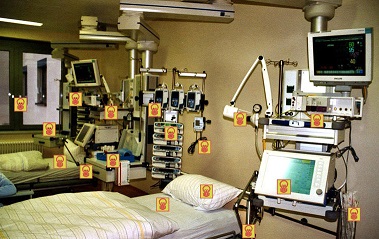OzSAGE Warns of Alarming Rise in Hospital-Acquired COVID-19 Infections In Australia, Calls for Urgent Preventive Measures
TMN News Team Aug 01, 2023 2 years, 6 months, 1 week, 4 days, 7 hours, 56 minutes ago
Ensuring Patient Safety and Protecting Healthcare Workers Amidst Ongoing COVID-19 Circulation
COVID-19 News: As Australia grapples with the ongoing waves of COVID-19 transmission, an alarming trend is raising concerns among healthcare authorities and experts. OzSAGE, the Australian Strategic Advisory Group on Emergencies, has issued a critical warning that more Australians are acquiring COVID-19 infections within hospital settings, leading to devastating consequences. This revelation has prompted OzSAGE to call for urgent and comprehensive preventive measures to safeguard patients, healthcare workers, and the public.
https://ozsage.org/media_releases/immediate-action-is-needed-to-reduce-hospital-acquired-covid-19-infections-and-deaths/

Hospital-Acquired COVID-19 Infections - A Major Concern
Hospital-acquired infections have long been a matter of concern within healthcare systems worldwide. These infections pose a severe risk to patients' well-being and are especially alarming when they involve highly contagious diseases like COVID-19. According to data obtained from Victorian health authorities, shocking statistics reveal that over 3000 people acquired COVID-19 while hospitalized in Victoria alone during 2022. Tragically, more than 10% of these individuals, at least 344 patients, succumbed to hospital-acquired COVID-19, shedding light on the severity of this issue.
Thailand Medical News had in a previous
COVID-19 News coverage based on a study conducted in Spain warned that nosocomial COVID-19 infections tend to have worse outcomes and higher risk of mortality compared to community-acquired COVID-19!
https://www.thailandmedical.news/news/breaking-spanish-study-shows-that-nosocomial-covid-19-infections-have-worse-outcomes-and-higher-mortality-risk-that-community-acquired-covid-19
A Neglected Crisis
Despite the severity of the situation and the potential for hospital-acquired COVID-19 infections to exacerbate the already strained healthcare systems, there is a lack of adequate attention and action from federal and state agencies. While they have advocated focused protection for vulnerable populations, the majority of patients in hospitals fall under this category and are not receiving adequate protection.
Challenges and Shortcomings in Preventive Measures
Several factors contribute to the concerning rise in hospital-acquired COVID-19 infections. Most states have removed the requirement for masking in healthcare settings, leading to a higher risk of transmission. Guidelines that suggest wearing masks around vulnerable patients are not being effectively enforced, raising concerns about lax adherence to preventive measures.
Moreover, unmitigated disease spread has significantly impacted health costs and pu
t severe pressure on healthcare capacity. Staff shortages due to COVID-19 absenteeism or long COVID have further hindered the healthcare system's ability to meet service demands. Burnout among frontline health workers is widespread, affecting the well-being of paramedics, cleaners, orderlies, nurses, doctors, and administration staff.
A Call to Action - Protecting Patients and Healthcare Workers
OzSAGE has called on Infection Prevention and Control Committees (IPACs) across Australia to take immediate action in preventing hospital-acquired COVID-19 infections. IPACs play a critical role in preventing infections within healthcare facilities and must act promptly in this crisis.
To achieve this, OzSAGE has outlined several key actions that need urgent implementation:
-Transparent Monitoring and Reporting: IPACs must lead the collection of data on hospital-acquired COVID-19 and establish systems for transparent monitoring and reporting. Comparing infection and death rates with other hospital-acquired infections will help set clear performance targets for hospitals.
-Reinstate Masking Requirements: Authorities should reconsider the decision to remove masking in healthcare settings. Masks remain a vital preventive measure in reducing asymptomatic transmission.
-Prioritize Workplace Safety: Protecting healthcare workers from infectious diseases should be a top priority, in line with Workplace Health and Safety (WHS) laws. IPACs should ensure diversity of expertise within their committees to address airborne disease prevention effectively.
-Improve Indoor Air Quality: Healthcare facilities should maintain indoor air free from airborne pathogens like SARS-CoV-2 by enhancing ventilation and filtration systems. Portable HEPA air purifiers can be employed when CO2 levels indicate poor ventilation.
-Test Patients on Admission: Implementing COVID-19 testing for all patients upon admission to hospitals will help define subsequent hospital-acquired infections, especially given the lack of community prevalence data.
It should be noted that nosocomial COVID-1 infections or COVID-19 infections contracted in a hospital setting is increasing in many countries around the world including in Europe, Asia, North America, Sout America and also in the Middle-Eats. The elderly and those immunocompromised should be more careful when visiting hospitals for non-COVID-19 routine health screenings or treatments.
Conclusion
The rise in hospital-acquired COVID-19 infections in Australia is a grave concern, demanding immediate and comprehensive action. OzSAGE's call for preventive measures to protect patients, healthcare workers, and the public is a clarion call for better management of this crisis. By prioritizing patient safety, enforcing workplace safety measures, and addressing the shortcomings in the healthcare system, Australia can combat the threat posed by hospital-acquired COVID-19 infections and emerge stronger in the face of this pandemic.
For the latest
COVID-19 News, keep to Thailand Medical News.
